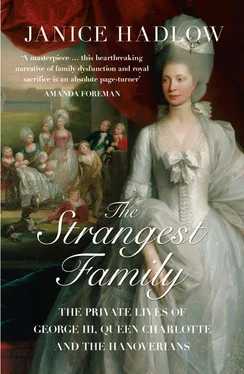He knew he needed someone to supply the determination and resilience in which he suspected he was so shamefully deficient. He was delighted – and profoundly relieved – to find a mentor to whom he could surrender himself absolutely, to whose better judgement he could happily submit. Without such a guide, he believed his prospects looked bleak indeed. ‘If I should mount the throne without the assistance of a friend, I should be in the most dreadful of situations,’ he assured the earl in 1758. 90
Bute also offered George genuine warmth and affection. His enthusiastic declarations of regard, his energetic and apparently disinterested commitment to his wellbeing, exploded into the prince’s arid, sentimental life. George’s devotion to Bute soon became the most important relationship in his life. ‘I shall never change in that, nor will I bear to be the least deprived of your company,’ he insisted vehemently. 91The growing intensity of the prince’s feelings was reflected not just in the content of his letters to Bute, but also in the way he addressed him. At first, he was ‘my dear Lord’, a term of conventional courtly politeness; soon this warmed into ‘my dear Friend’; but very quickly, the strength of the prince’s feelings were made even plainer. All obstacles, he wrote to the earl with unembarrassed devotion, could and would be overcome, ‘whilst my Dearest is near me’. 92Bute was not just mentor and role model to the prince; he was also the first person to unearth George’s hitherto deeply buried but strong emotions.
Bute broke through the prince’s habitual reserve partly by what he did, and partly by who he was. He was a compellingly attractive figure to a fatherless, faltering boy: handsome, assured and experienced, he was everything George knew he was not. Augusta, who was suspicious of almost everyone, admired and respected Bute, and the earl was unequivocal in his praise of George’s dead father, declaring that he had gloried in being known as Frederick’s friend. Unlike many of his predecessors, Bute actually seemed to like the prince, and he approached the prospect of training him for kingship with a galvanising enthusiasm. ‘You have condescended to take me into your friendship,’ he told the prince, ‘don’t think it arrogance if I say I will deserve it.’ 93Bute’s breezy optimism about the task before him was in stark contrast to the dour resignation of previous instructors. ‘Use will make everything easy,’ he confidently assured his faltering charge. 94
Leaving Latin behind at last, George and Bute embarked on a course of more contemporary study. Bute encouraged the prince to investigate finance and economics, and together they read a series of lectures by the jurist William Blackstone that was to form the basis of his magisterial work on the origins of English common law. Bute even ventured confidently where Andrew Stone had feared to tread. George’s essay, ‘Thoughts on the English Constitution’, included opinions that might have reassured Walpole, had he read it, so impeccably Whiggish were its sentiments. The Glorious Revolution had, the prince wrote, rescued Britain ‘from the iron rod of arbitrary power’, while Oliver Cromwell was described, somewhat improbably by the heir to the throne, as ‘a friend of justice and virtue’. 95
Whilst Bute’s more liberal definition of ‘what is fit for you to know’ undeniably piqued George’s interest, it was his bigger ideas that consolidated his hold over the prince and secured his pre-eminent place in George’s mind and heart. The most significant of these was one which would transform the prince’s prospects and offer him a way out of the despondency that had threatened to overwhelm him since his father’s death. In the late 1750s, Bute proposed nothing less than a new way of understanding the role of monarchy, offering George an enticingly credible picture of the kind of ruler he might aspire to become. For the first time he was presented with a concept of kingship that seemed within his capacity to achieve, that spoke to his strengths rather than his failings. It changed the nature of George’s engagement, not just with Bute but, more significantly, with himself. It gave him something to aim for and believe in; the delivery of this vision was ‘the goal’ that George believed was the purpose of his partnership with Bute. Indeed, it far outlasted his relationship with the earl; until his final descent into insanity half a century later, it established the principles by which he lived his life as a public and private man.
In Bute’s ideal, the role of the king was not simply to act as an influential player in the complex interplay of party rivalry that dominated politics in mid-eighteenth-century Britain. It was the monarch’s job to rise above all that, to transcend faction and self-interest, and devote himself instead to the impartial advancement of the national good. This was not an original argument; it derived from Henry, Viscount Bolingbroke’s extremely influential Idea of a Patriot King , written in 1738 (though not published until 1749). Frederick had been much taken with Bolingbroke’s ideas, and the ‘Instructions’ he wrote as a political testimony for his son drew strongly on many of Bolingbroke’s conclusions, but Frederick was primarily concerned with the practical political implications of Bolingbroke’s ideas. The ‘Instructions’ is mostly a list of recommendations intended to secure for a king the necessary independence to escape the control of politicians, most of which revolve around money: don’t fight too many wars, and separate Hanover, a drain on resources, from Great Britain as soon as possible.
Bute too was interested in the exercise of power; but, always drawn towards philosophy, he was even more fascinated by its origins, and sought to formulate a coherent, modern explanation for the very existence of kingship itself. Choosing those measures which best reflected the ambitions of a ‘patriot’ king was secondary, in his mind, to establishing the justification by which such a king held the reins of government in the first place. For Bute, the answer was simple: it was the virtue of the king – the goodness of his actions, as both a public and a private man – that formed the source of all his power. Virtue was clearly the best protection for an established ruler; a good king was uniquely positioned to win the love and loyalty of his people, making it possible for him to appeal credibly to the sense of national purpose that went beyond the narrower interests of party politicians. But the connection between morals and monarchy went deeper than that. Virtue was not just an attribute of good kingship; it was also the quality from which kings derived their authority. And the virtues Bute had in mind were not cold civic ones peculiar to the political world, of necessity and expediency. They were the moral standards which all human beings were held to, those which regulated the actions of all decent men and women. Kingship offered no exemption from moral conduct; on the contrary, more was expected of kings because so much more had been given to them. Moral behaviour in the public realm was therefore indivisible from its practice in the private world. To be a good king, it was essential to try to be a good man.
The place where private virtue was most clearly expressed, for Bute as for most of his contemporaries, was within the family. Here, in the unit that was the basic building block of society, the moral life was most easily and most rewardingly to be experienced. The good king would naturally enjoy a family life based on shared moral principles. Indeed, for Bute, authority had itself actually originated within the confines of the family. ‘In the first ages of the world,’ as he explained to George, private and public virtue had been one and the same thing; in this pre-political Eden, there was no distinction between the two, as government and family were not yet divided: ‘Parental fondness, filial piety and brotherly affection engrossed the mind; government subsisted only in the father’s management of the family, to whom the eldest son succeeding, became at once the prince and parent of his brethren.’
Читать дальше












